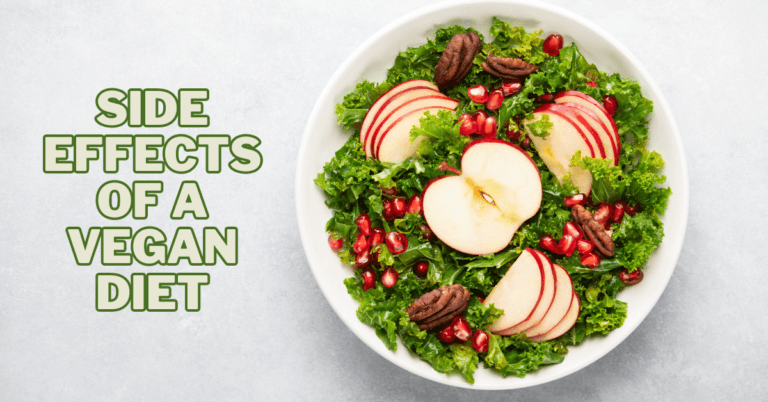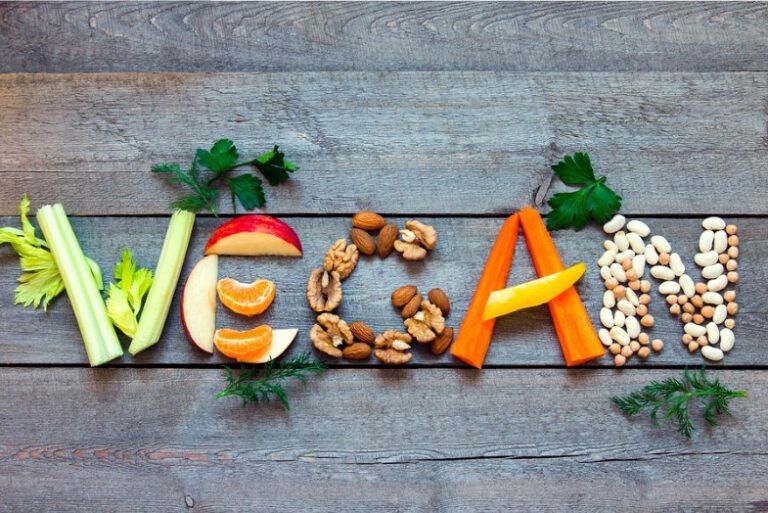Potential Health Benefits Of Veganism
Potential Health Benefits Of Veganism
Are you interested in learning more about the potential health benefits of veganism? Veganism has become increasingly popular for ethical, environmental, and health reasons.
All animal products, such as meat, dairy, eggs, and honey, are prohibited in a vegan diet.
This article will specifically focus on the potential health benefits of a vegan lifestyle, even though veganism's ethical and environmental aspects are often explored.
We will examine the scientific support for the beneficial effects of a well-planned vegan diet on general health and well-being, from enhanced heart health to decreased risk of chronic diseases.
Join us as we explore the potential health benefits that await people who adopt a plant-based, vegan diet, whether you are thinking about switching to a vegan lifestyle or are just curious to learn more.
Unlocking The Potential Health Benefits Of Being Vegan
Step into a world where the power of food choices extends beyond satisfying hunger and nourishing the body.
Imagine a lifestyle that not only promotes compassion towards animals and environmental sustainability but also holds the potential to enhance your overall well-being.
Welcome to veganism, a conscious lifestyle that embraces a plant-based diet free from animal products.
The potential advantages of adopting a vegan lifestyle are abundant, from reducing the risk of chronic diseases to supporting optimal digestion and radiant skin.
Adopting a vegan lifestyle can offer a range of health benefits. Here are some of the potential advantages:
1. Reduced Risk Of Chronic Diseases
Research suggests that adopting a well-planned vegan diet can significantly reduce the risk of chronic diseases. One notable benefit is a reduced risk of heart disease.
Diets based on plants are inherently low in cholesterol and saturated fat, which helps prevent heart disease. Instead, they emphasize heart-healthy fats like those found in nuts, seeds, avocados, and olive oil.
The abundance of fiber in plant-based foods also plays a crucial role in heart health by helping to lower cholesterol levels and maintain healthy blood pressure.
Additionally, a vegan diet has been associated with a decreased risk of type 2 diabetes.
Complex carbs, fiber, and low levels of refined sugar are often found in plant-based diets, which can help control blood sugar levels and increase insulin sensitivity.
By doing so, the chance of becoming type 2 diabetes and insulin resistance can be decreased.
2. Reduced Risk Of Heart Disease
A vegan diet may improve the health of your heart. A vegan diet can lower the risk of heart disease by removing or reducing animal products: dietary cholesterol and saturated fat.
Plant-based diets are heart-healthy since they often include no cholesterol and little saturated fat.
Additionally, the vegan diet emphasizes whole grains, fruits, vegetables, legumes, nuts, and seeds, providing a rich array of nutrients, including fiber, antioxidants, and phytochemicals.
These components help support cardiovascular health by reducing inflammation, improving blood pressure, and promoting healthy cholesterol levels.
Plant-based fat sources, such as nuts, seeds, and avocados, contain monounsaturated and polyunsaturated fats, which have been linked to lower LDL (bad) cholesterol levels and reduced risk of heart disease.
Olive oil, known for its heart-healthy properties, as a primary cooking oil in vegan cuisine, further supports cardiovascular well-being.
Overall, a well-planned vegan diet that incorporates a variety of plant-based foods and limits processed and high-sodium options can contribute to a healthier heart and a reduced risk of cardiovascular disease.
3. Weight Management
Plant-based diets have been linked to weight management and loss due to several factors.
First, plant-based foods are rich in dietary fiber, crucial in promoting satiety and reducing overeating.
Fibre adds bulk to meals, making you feel fuller for longer periods. It also slows digestion, stabilizes blood sugar levels, and helps control cravings.
Second, many plant-based foods, such as fruits, vegetables, whole grains, and legumes, have a lower calorie density than animal products and processed foods.
This means that you can consume a larger volume of plant-based foods for the same number of calories, which can help you feel satisfied while managing your calorie intake.
Additionally, plant-based diets often limit or eliminate high-calorie, high-fat animal products, which can contribute to weight gain.
It's important to note that weight management is a complex issue influenced by various factors, including overall calorie intake, physical activity, and individual metabolism.
However, a well-balanced and varied plant-based diet can support weight management goals and promote a healthy body weight.
4. Improved Digestion
A vegan diet eases digestion since it contains a lot of fiber. In addition to being abundant in fiber, fruits, vegetables, whole grains, legumes, nuts, and seeds are produced by plants.
Maintaining regular bowel motions and avoiding constipation requires adequate consumption of fiber. The feces gets bulkier, making moving through the digestive tract simpler.
As nourishment for the good bacteria in the gut, fiber also functions as a prebiotic. A healthy balance of gut bacteria must be fostered to digest food and absorb nutrients properly.
Moreover, fiber helps regulate blood sugar levels by slowing down glucose absorption, providing a more stable energy source.
It can also contribute to weight management as it adds volume to meals, promoting feelings of fullness and reducing overeating.
You can support a healthy digestive system and promote gut health by incorporating fibre-rich plant-based foods.
5. Enhanced Skin Health
A vegan diet focused on whole, unprocessed plant-based foods can positively impact skin health. Plant-based foods are abundant in antioxidants, vitamins, and minerals, which are crucial in maintaining a youthful and radiant complexion.
Antioxidants work to reduce oxidative stress, neutralize dangerous free radicals, and shield the skin from harm from UV radiation and other environmental aggressors.
The good function of the skin and collagen formation depends on the vitamins and minerals in plant-based diets, such as vitamins A, C, and E, zinc, and selenium. These nutrients promote skin elasticity, hydration, and overall skin health.
Additionally, a vegan diet can aid in lowering the consumption of inflammatory foods linked to skin conditions like acne and eczema, like processed meats and dairy products.
Your body will have the building blocks it needs to maintain vibrant and healthy skin if you choose a plant-based diet full of colourful fruits and vegetables, whole grains, nuts, and seeds.
However, it's important to note that various factors, including genetics, lifestyle, and skincare practices, can influence individual skin health.
Consulting with a dermatologist and following a comprehensive skincare routine can further support your skin health goals.
6. Reduced Inflammation
Adopting a plant-based diet can contribute to reducing inflammation in the body.
Plant-based diets are typically abundant in fruits, vegetables, whole grains, and legumes, rich in anti-inflammatory compounds such as antioxidants, phytochemicals, and fiber.
These components have been shown to help lower inflammatory markers in the body. Arthritis, heart disease, and a few types of cancer are just some illnesses connected to chronic inflammation.
By incorporating anti-inflammatory foods into your diet, you can help mitigate the risk of these conditions.
The fibre found in plant-based foods also plays a significant role in reducing inflammation. It supports a healthy gut microbiome, promoting the growth of beneficial bacteria that produce short-chain fatty acids.
These fatty acids have anti-inflammatory effects and help maintain a balanced immune response.
Moreover, plant-based diets often limit or exclude pro-inflammatory foods, such as processed meats, refined sugars, and trans fats, which can contribute to inflammation.
By embracing a plant-based lifestyle and prioritizing anti-inflammatory foods, you can reduce chronic inflammation and promote overall health and well-being.
7. Potential For Lower Cholesterol Levels
One potential benefit of a vegan diet is the potential for lower cholesterol levels. Dietary cholesterol is a nutrient in animal products, including meat, dairy, and eggs.
This cholesterol can raise blood cholesterol levels. Vegans naturally avoid dietary cholesterol by decreasing or avoiding certain animal products.
A further factor contributing significantly to high cholesterol levels is saturated fat, often low in plant-based diets. Animal products and some tropical oils are the primary sources of saturated fat.
Vegans can assist in lowering their blood cholesterol levels by cutting out or reducing saturated fat. A vegan diet focuses on heart-healthy fats, like those in nuts, seeds, avocados, and olive oil.
These unsaturated fats have positively impacted cholesterol levels, promoting a healthier lipid profile.
By adopting a well-balanced vegan diet that focuses on whole plant foods, individuals may experience improved cholesterol levels, reducing the risk of heart disease and promoting cardiovascular health.
It's important to note that individual results may vary, and it's advisable to monitor cholesterol levels and consult with a healthcare professional for personalized guidance.
8. Better Blood Sugar Control
Plant-based diets emphasizing whole grains, legumes, and fibre-rich foods, offer potential benefits for blood sugar control and insulin sensitivity.
The complex carbohydrates in whole grains and legumes release glucose into the bloodstream more gradually than refined carbohydrates.
This helps prevent rapid spikes in blood sugar levels and provides a steady energy source. The high fiber content of plant-based diets is also essential for controlling blood sugar.
Fibre slows down glucose absorption, causing blood sugar levels to rise gradually and steadily after meals.
Fibre also encourages a feeling of fullness, which can help with weight management and stopping overeating, which is important for blood sugar regulation.
Natural reductions in saturated and trans fats, which can cause insulin resistance, can be found in plant-based diets.
Individuals can improve their insulin sensitivity by reducing their intake of these fats and focusing on plant-based sources of fat, such as nuts, seeds, and avocados.
These dietary factors make plant-based diets a promising approach for individuals with type 2 diabetes or those at risk of developing the condition, helping them achieve better blood sugar control and overall metabolic health.
However, working with a healthcare professional or registered dietitian is important to develop a personalized meal plan and monitor blood sugar levels when making significant dietary changes.
9. Reduced Risk Of Kidney Stones
A vegan diet may reduce the risk of developing kidney stones. Vegan diets, emphasizing water-rich fruits and vegetables, promote increased fluid intake.
Staying well-hydrated is crucial for kidney health as it helps maintain proper urine production and dilution, reducing the concentration of stone-forming substances in the kidneys.
Additionally, plant-based diets tend to be naturally higher in potassium, which can play a role in kidney stone prevention.
Adequate potassium intake supports optimal kidney function and helps prevent the accumulation of calcium in the urine, a common factor in the formation of kidney stones.
Moreover, a vegan diet that emphasizes whole grains, legumes, and fibre-rich foods promotes regular bowel movements, reducing the risk of constipation.
Constipation can contribute to the accumulation of waste products and the formation of kidney stones.
By incorporating a variety of water-rich fruits and vegetables, along with other plant-based foods, individuals can support proper hydration, maintain kidney function, and potentially decrease the risk of kidney stone formation.
It's important to note that individual factors, such as medical history and dietary habits, can influence the risk of kidney stones.
It is advised to seek individualized advice and direction on preserving kidney health from a healthcare provider or qualified dietician.
10. Reduced Allergy Symptoms
A vegan diet may relieve certain allergy symptoms for some individuals. Plant-based diets are typically lower in allergenic foods such as dairy and eggs, common triggers for allergies and intolerances.
Dairy products, for example, contain proteins like casein and whey, which can cause allergic reactions or intolerances in susceptible individuals.
By eliminating dairy and other animal products from their diet, individuals may experience a reduction in symptoms associated with milk allergies or lactose intolerance.
Additionally, eggs are another common allergenic food, particularly for children. Individuals with egg allergies can alleviate symptoms by avoiding eggs and focusing on plant-based alternatives.
Furthermore, plant-based diets rich in fruits, vegetables, whole grains, and legumes provide essential nutrients and antioxidants that support a healthy immune system.
A strong immune system can help reduce the severity of allergic reactions.
It's important to note that food allergies and intolerances are highly individual, and individuals should work with healthcare professionals to identify their specific triggers and dietary needs.
While a vegan diet can relieve some individuals, it's crucial to ensure that nutritional needs are met through careful meal planning and supplementation if necessary.
11. Potential Anti-Aging Effects
A plant-based diet has the potential to offer anti-aging effects thanks to its rich array of antioxidants, vitamins, and minerals.
To prevent oxidative stress, which has the potential to harm cells and hasten aging, antioxidants are essential.
A plant-based diet's mainstays of fruits, vegetables, and whole grains also contain a variety of phytochemicals, vitamins C and E, and beta-carotene, good sources of antioxidants.
These substances aid in the elimination of negative free radicals and offer antioxidant defence for cells.
Additionally, plant-based foods are often nutrient-dense, providing essential vitamins and minerals that support skin health, collagen production, and overall vitality.
For instance, vitamin C is necessary for synthesizing collagen, a protein that helps maintain skin elasticity and reduce the appearance of wrinkles.
Plant-based sources of omega-3 fatty acids, such as chia seeds and walnuts, may also contribute to a youthful appearance and healthy skin.
Furthermore, the high fiber content in plant-based diets aids in maintaining a healthy weight, which can indirectly contribute to a more youthful appearance.
By nourishing your body with various plant-based foods, you can provide the necessary tools to combat cellular damage, promote skin health, and slow aging.
However, it's important to note that individual factors, including genetics, lifestyle habits, and overall health, also play a significant role in aging.
12. Lower Risk Of Gallstones
A vegan diet, particularly one high in fiber, may reduce the incidence of gallstone development.
Gallstones are solid objects in the gallbladder that are frequently brought on by an imbalance in the makeup of bile or a buildup of cholesterol.
Gallstone formation can be decreased by maintaining regular bowel movements and controlling bile production with a diet high in fibre.
In the digestive tract, fiber binds to cholesterol, limiting absorption and encouraging its excretion through feces.
Individuals can support healthy digestion and decrease the likelihood of gallstones by increasing fiber intake through a plant-based diet that includes whole grains, legumes, fruits, vegetables, and nuts.
Additionally, a vegan diet typically restricts or eliminates high-fat animal products, which can contribute to forming cholesterol-based gallstones.
Adopting a plant-based lifestyle and incorporating fibre-rich foods can reduce their risk of gallstones and promote gallbladder health.
However, it's important to note that individual factors, such as genetics and overall health, can also influence the risk of gallstones.
Consulting with a healthcare professional or registered dietitian is recommended for personalized advice on maintaining gallbladder health.
Conclusion
Finally, there are a variety of possible health advantages to becoming a vegan.
A well-planned vegan diet that prioritizes whole plant foods may reduce the risk of some types of cancer, type 2 diabetes, and heart disease in people who consume a lot of plant-based meals.
Generally speaking, vegan diets are lower in saturated fat and cholesterol, which may help to enhance heart health and lower cholesterol levels.
The emphasis on fibre-rich foods promotes better digestion, weight management, and reduced risk of constipation.
It's important to note that adopting a vegan lifestyle requires proper planning to ensure adequate nutrient intake, particularly for nutrients like vitamin B12, iron, and omega-3 fatty acids.
A vegan diet can be adopted with the help of a qualified healthcare expert or certified dietitian who can offer you individualized advice and support.
When combined with a well-balanced and varied approach to nutrition, the potential health benefits of being vegan make it a compelling choice for those seeking a compassionate and health-conscious lifestyle.
I trust you enjoyed this article about the Potential Health Benefits Of Veganism. Please stay tuned for more blog posts to come shortly. Take care!
JeannetteZ
>>>Please click here to read my Vegan Travel Guides To World Destinations<<<
>>>Want To Learn How To Create Delicious, Cruelty-Free, Healthy AND 100% Vegan Meals? Try These Awesome Vegan Cooking Courses With A Free 7-DAY MEMBERSHIP<<<
Your Opinion Is Important To Me
Ideas? Thoughts? Questions? I would love to hear from you. Please leave me your questions, experience, and remarks about the Potential Health Benefits Of Veganism article in the comments section below. You can also reach me by email at Jeannette@LivingTheVeganLifestyle.org.
Disclosure
This post may contain affiliate links. I earn from qualifying purchases as an Amazon Associate and other affiliate programs. Please read my full disclosure.
Here are links to some of my favourite articles:
Best Vegan Guide To Clothing And Apparel
Best Vegan Detox And Cleansing Diets
Best Vegan Diet For Healthy Glowing Skin



















